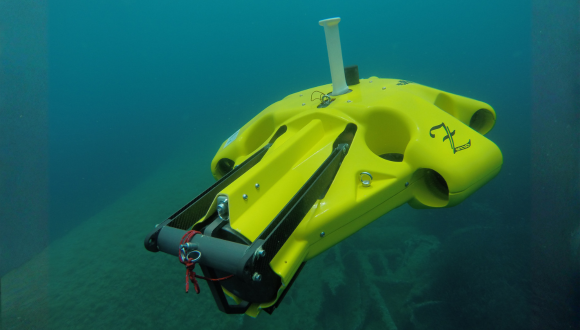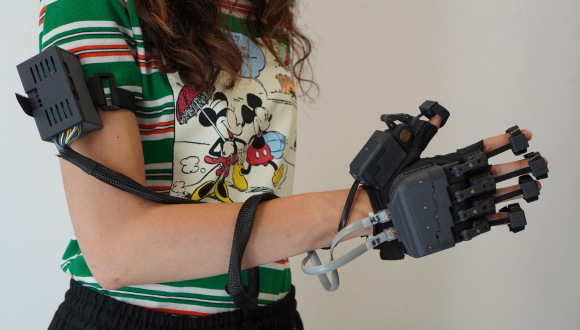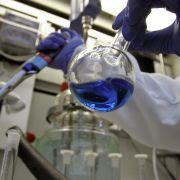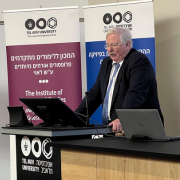Underwater Robotics Expert Lectures at Tel Aviv University
Prof. Benedetto Allotta from the University of Florence joins TAU as a visiting scholar
Lowy Distinguished Guest Professors
Who they are: Renowned international scholars invited to TAU through the Institute of Advanced Studies
What they do: Lead research, give talks, and collaborate with TAU teams
Duration: 1-week to 3-month visits
For Prof. Benedetto Allotta, this year’s visit to Tel Aviv University as a Lowy Distinguished Guest Professor builds on a connection to Israel that began more than a decade ago.
Originally from Sicily and now based in Florence, he first came to Israel in 2014 while collaborating with the Israel Antiquities Authority. Wanting to understand the culture before he arrived, he turned to a colleague in Florence who teaches biblical Hebrew for guidance.
“I asked her to teach me the Hebrew alphabet. This helped me gain a basic understanding of the place before my arrival,” recalls Prof Allotta.
“Since that initial visit, I have returned to Israel ten times, traveled extensively throughout the country, and formed many meaningful friendships.”
A Decade of Collaboration and Friendship
Over the past decade, Professor Allotta, a Mechanical Engineering Professor at the University of Florence, has developed a profound connection with Israel. His relationship with the country deepened further when he was invited to serve as a Lowy Distinguished Guest Professor, within the framework of the Institute of Advanced Studies and the Lowy International School.
In November, Professor Allotta gave several lectures at Tel Aviv University on cutting-edge robotics research projects, which drew considerable interest.
Professor Allotta opened his talks at TAU by speaking candidly about his longstanding support for Israel, including his leadership role in the Association Italia–Israele Florence. Over the years, he has hosted Israeli scholars and students in his lab and has spoken up for Israel on social media. These actions sometimes came at a personal cost.
In February 2025, he helped organize a TAU workshop in Florence on antisemitism and resilience. Once news of the workshop became public, pro-Palestinian activists began targeting him online, leading to widespread harassment across several platforms. He faced threats, protests, and even needed police protection. A disciplinary procedure initiated at his university, based on claims of racism and Islamophobia, was eventually dismissed at the first hearing.
Professor Allotta also shared how he traveled to communities affected by the events of October 7th, including Ofakim, Sderot, some kibbutzim and the Nova festival site. Meeting survivors and bereaved families deeply moved him. At one point in his lecture, he paused to regain composure, gently telling the audience, “I’m ok, let’s move on,” when they urged him to take his time.
Research at the Frontier of Robotics
At the Mechatronics and Dynamic Modeling Lab (MDM) at the University of Florence, Professor Allotta focuses on two major research areas: marine robotics and wearable robotics.
He observes that the underwater world is explored far less than outer space.
“The working conditions of underwater workers are far worse than the working conditions of astronauts.”
To address these challenges, his team develops highly advanced robots designed to substitute for humans in the depths of the sea. These underwater robots serve a wide range of purposes and are utilized by industries, navies, and archaeological researchers.

ZENO Autonomous Underwater Vehicle with extreme maneuverability capabilities is one of maritime robots developed in Professor Allotta's team at his lab
In the realm of wearable robotics, Professor Allotta specializes in creating hand exoskeletons aimed at rehabilitation and daily assistance for people with disabilities.
The inspiration for this work came from an Italian patient affected by Clenched Fist Syndrome (CFS), who approached Professor Allotta with a request for a mechanical device that could restore basic hand function.
This personal story became a catalyst for the development of innovative solutions in wearable robotics to enhance quality of life for individuals facing physical challenges.

Restoring hand function with wearable robotics
Prof Allotta presented this research in the Biological and Soft Matter Physics Seminar series at the TAU School of Physics and Astronomy, where he highlighted how engineering innovation and rehabilitation science are coming together to shape new possibilities in human–machine interaction.
For TAU’s engineering and biophysics students and faculty, the lectures by Prof Allotta offered a fresh perspective on how robotics can improve lives both underwater and on land.
Inspired by the intersection of robotics, physics, and human health?
Learn more about TAU’s MSc in Biomedical Engineering and join a community advancing non-invasive technologies that improve diagnostics and patient care.





